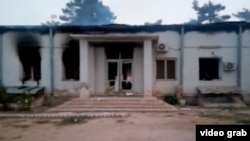All aid organizations have left the Afghan city of Kunduz in the aftermath of the U.S. bombing of the hospital run by Doctors Without Borders, the U.N. humanitarian agency said Tuesday.
More than 20 people were killed and dozens wounded in the U.S. bombing of the hospital Saturday. The attack was widely condemned, with many calling it a criminal act.
Two U.N. entities, four national NGOs and 10 international NGOs have been temporarily relocated due to the ongoing conflict and unstable and fluid security situation in Kunduz," U.N. humanitarian agency (OCHA) spokesman Jens Laerke told AFP.
The loss of the hospital run by Doctors Without Borders, also referred to by its French acronym, MSF, is having an immediate and devastating impact on the population.
Laerke said, “There is now no functioning trauma care hospital in the city after this bombing. In fact, the MSF hospital was the only facility of its kind in the entire northeastern region of the country, serving some 300,000 people in Kunduz alone.
"So, 300,000 people are now without a hospital," Laerke said.
People fleeing
Thousands of people have fled the city and an estimated 8,500 families have been displaced in the northeast as a result of the fighting, according to OCHA. It said water and electricity reportedly are off in much of the city and most food markets are closed.
Laerke said the airport is closed to civilian aircraft and entering the city by roads is too dangerous, because of either bombs, roadblocks or the threat of ambush, leaving humanitarian agencies unable to assess the damage and needs of the people.
He said the population's needs are expected to include food, emergency shelter, water and sanitation, emergency health, psychological counseling, and family tracing and reunification services.
There are some supplies on hand to provide people with their basic needs, but Laerke said those supplies cannot be distributed because aid agencies cannot go to Kunduz.
The United States said it has launched an investigation into the airstrikes, but Doctors Without Borders and the United Nations said there should be an international impartial investigation.




